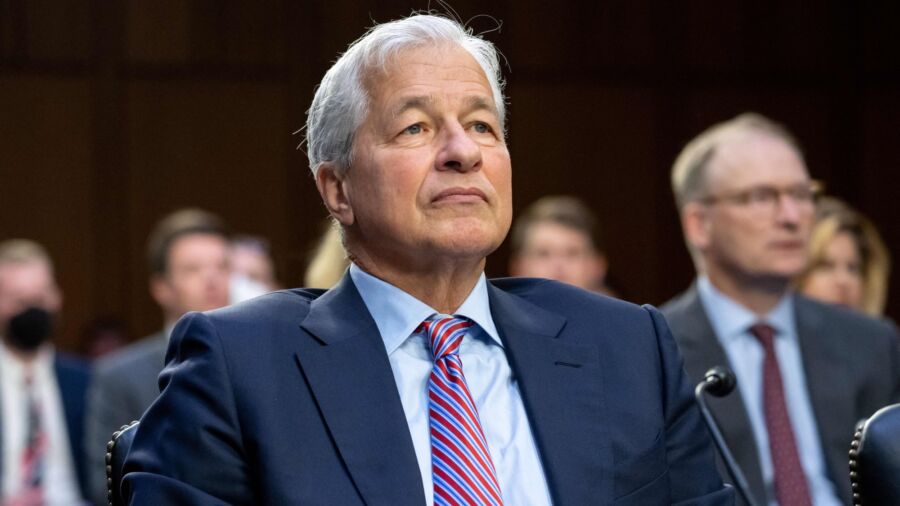JPMorgan Chase CEO Jamie Dimon told a financial conference in New York on Monday that people who assume that the U.S. economy will continue to boom for years on the back of consumer strength are making “a huge mistake.”
Mr. Dimon made the remarks at the Barclays Global Financial Services Conference on Sept. 11, at which he warned of a number of risks to the economy, including the Ukraine war, monetary tightening by the Federal Reserve, and increasing reliance on government spending.
“To say the consumer is strong today, meaning you are going to have a booming environment for years, is a huge mistake,” he said.
The booming economy narrative rose to prominence in recent months, driven by strong retail sales and wage growth, while recession fears have eased. But there are signs that the recent rise in consumer sentiment has been short-lived and that the economy is facing some headwinds.
Consumer Strength Weakening?
Consumer spending, which represents roughly 70 percent of U.S. gross domestic product, posted solid growth in July, the latest month of available data. However, economists widely expect the past year of aggressive Fed interest rate hikes to weigh more heavily on domestic demand.
The latest data on retail sales showed that Americans spent more than expected in July, splurging on hobbies, sporting goods, and clothing, prompting economists at Goldman Sachs to raise their third-quarter gross domestic product estimate by seven-tenths of a percentage point to a 2.2 percent annualized rate.
However, there are signs that the boom may not last as the latest consumer tracker for August from Deloitte says that financial well-being sentiment has stagnated, with the percentage of consumers worried about savings and postponing big purchases on the rise, while spending intentions “remain on a long-term downtrend.”
A separate barometer of consumer confidence from the Conference Board found that, after a sharp uptick in July, its gauge retreated to a reading “a hair above 80—the level that historically signals a recession within the next year.”
While financial markets have, over the summer, largely dismissed recession fears, fresh data suggests that the country may be facing a “stagnation” point.
“A near-stalling of business activity in August raises doubts over the strength of U.S. economic growth in the third quarter,” Chris Williamson, chief business economist at S&P Global Market Intelligence, said in a report that showed new orders tumbling, input cost inflation rising, and the pace of job creation slowing.
Mr. Dimon’s remarks at Monday’s conference tapped into this sentiment, with the JPMorgan chief saying that the health of U.S. consumers and businesses was still “pretty good,” although he warned against being overconfident.
Key concerns that he mentioned were the twin factors of central bank efforts to roll back easy money policies—which have pushed inflation to multi-decade highs—and governments “spending like drunken sailors.”
“I think there’s a false sense of security that those two things will end up being OK. I don’t know,” he said.
Higher Capital Requirements
At the conference, Mr. Dimon also took aim at the higher capital requirements U.S. regulators have proposed for banks, warning that such measures could starve the economy of credit and amount to another hurdle to growth.
“I wouldn’t be a big buyer of a bank,” he said, drawing laughter from the audience, while calling the new proposal “hugely disappointing.”
Mr. Dimon, who heads America’s biggest lender, questioned what regulators were trying to accomplish by proposing the new rules, which would require bigger U.S. banks, with total assets of $100 billion or more, to set aside billions of dollars to bolster their ability to absorb losses when times get tough.
“All I want is fairness, transparency, openness,” Mr. Dimon said with regards to the regulatory proposal, which would require banks with total assets of $100 billion or more to maintain an additional 2 percentage points in capital above current levels.
The regulatory proposal has been roundly criticised by the banking industry, with Bank Policy Institute (BPI) President and CEO Greg Baer warning of “higher costs to consumers and greater instability for markets,” in a statement obtained by The Epoch Times.
Mr. Dimon said that the new regulatory proposal would require JPMorgan to hold 30 percent more in capital than a European lender, which he said was an unfair burden on U.S. banks.
In contrast to Mr. Dimon’s take on tougher bank capital rules, some U.S. regulators have said the proposal doesn’t go far enough.
Minneapolis Federal Reserve President Neel Kashkari recently said he expects more government regulation of the banking sector in light of several high-profile bank failures.
Mr. Kashkari also said that he’d like to see the proposed capital requirement rules apply to smaller institutions with less than $100 billion in total assets, though he didn’t specify what threshold he had in mind.
At Monday’s conference, Mr. Dimon also said he believes that the Chinese market is no longer as attractive to foreign investors as it once was.
“In terms of our own business, the risk-reward [from China], which was very good, has now become okay. The risk is bad,” he said, adding that JPMorgan has become more cautious about managing its risk.
Caution has also entered the homebuyer market in the United States, with mortgage applications dropping last week to their lowest point since 1996.
Reuters contributed to this report.
From The Epoch Times

